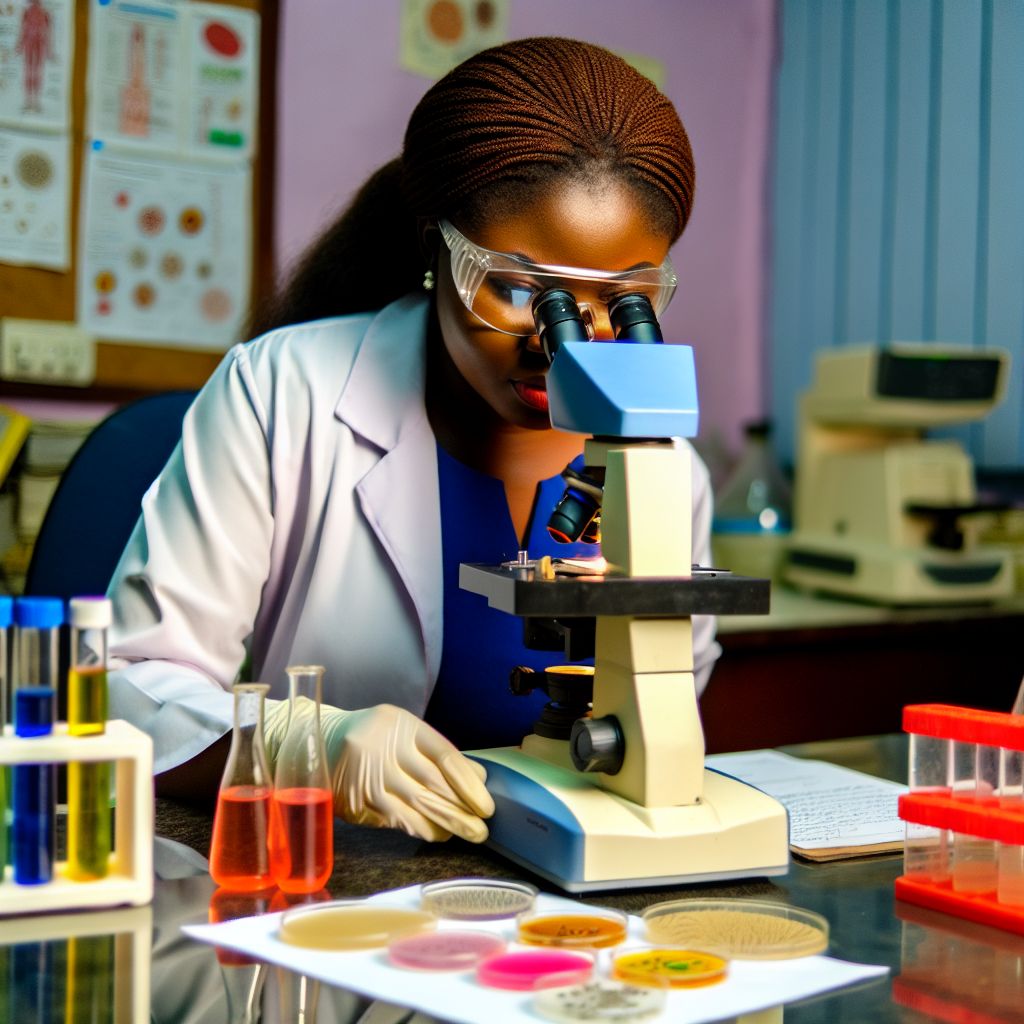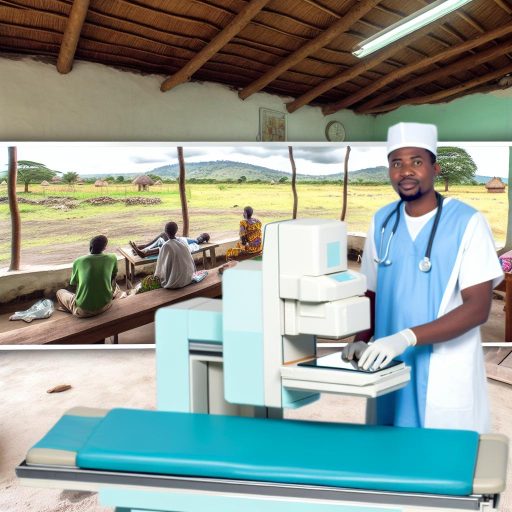Introduction
Microbiology is the study of microorganisms, including bacteria, viruses, fungi, and parasites.
Microbiology plays a crucial role in industries such as healthcare, agriculture, food production, and environmental protection.
Nigeria’s economy has been significantly influenced by the field of microbiology, contributing to growth and development in various sectors.
History of Microbiology in Nigeria
Microbiology in Nigeria dates back to the early 20th century.
The discipline has undergone significant growth and development.
Initially, microbiology in Nigeria was heavily influenced by colonial education.
Development of Microbiology in Nigeria
Post-independence, Nigeria began to establish its own research institutions.
This led to the growth of microbiology as a field of study in the country.
Universities and research centers started offering specialized programs in microbiology.
Key Milestones and Achievements
- The establishment of the Nigerian Society for Microbiology in 1972.
- The creation of microbiology departments in several Nigerian universities.
- Pioneering research in areas like infectious diseases and biotechnology.
Evolution of Microbiology in Nigeria
- Increased collaboration with international organizations and researchers.
- Adoption of modern technologies in microbiology research.
- Focus on addressing local health challenges through microbiological research.
Microbiology Transforms Agriculture in Nigeria
Microbiology plays a crucial role in transforming the agricultural sector in Nigeria.
Let’s delve into how microbiology has impacted agriculture in the country.
How Microbiology has Improved Agricultural Practices in Nigeria
Microorganisms are essential for various agricultural practices in Nigeria.
They play a significant role in improving soil quality, enhancing crop yield, and combating plant diseases.
- Microorganisms such as bacteria and fungi help in decomposing organic matter, releasing essential nutrients for plant growth.
- Microbes like nitrogen-fixing bacteria convert atmospheric nitrogen into a form that plants can absorb, reducing the need for synthetic fertilizers.
- Microbial pesticides are used to control pests and diseases, reducing the reliance on harmful chemical pesticides.
The Role of Microbiology in Soil Fertility and Crop Yield Improvement
Microbial activities in the soil contribute significantly to soil fertility and crop productivity.
It is noteworthy that these microbes provide numerous benefits to farmers across Nigeria.
- Microorganisms enhance soil structure and aeration, promoting better root growth and nutrient uptake by plants.
- Beneficial microorganisms can suppress soil-borne pathogens, reducing crop losses due to diseases.
- Microbes help in breaking down organic matter, releasing nutrients like phosphorus and potassium for plant utilization.
Success Stories of Microbiology Applications in Nigerian Agriculture
Several success stories highlight the positive impact of microbiology applications in improving agricultural practices and increasing farm productivity in Nigeria.
- Introduction of biofertilizers containing beneficial microbes has boosted soil fertility and crop yields in various agricultural systems.
- Integrated pest management approaches, including the use of biocontrol agents, have reduced pesticide use and improved crop health.
- Bioremediation techniques involving microorganisms have been successfully employed to clean up polluted soils, restoring their productivity.
Microbiology has revolutionized agriculture in Nigeria by offering sustainable solutions to improve soil fertility, enhance crop yield, and promote ecological balance in farming systems.
Its continued application is essential for the growth and development of the country’s agricultural sector.
Explore Further: Optometry in Nigeria: Overview and Career Opportunities
Impact of Microbiology on Healthcare in Nigeria
Microbiology has played a significant role in transforming healthcare in Nigeria.
It contributes to the diagnosis, treatment, and prevention of diseases across the country.
Here are some key points that highlight the importance of microbiology in healthcare:
Disease Diagnosis and Treatment
- Microbiology has revolutionized disease diagnosis in Nigeria.
- It provides tools for identifying pathogens responsible for various illnesses.
- The ability to isolate and characterize microorganisms enables targeted treatments.
- These advances lead to better patient outcomes.
- Rapid diagnostic tests developed through microbiology research assist healthcare providers.
- These tests help make timely decisions, especially in infectious disease cases.
Development of Vaccines and Antibiotics
- Microbiology research has been instrumental in vaccine development.
- Vaccines target common infectious diseases prevalent in Nigeria, like malaria.
- Vaccination campaigns supported by microbiologists significantly reduce disease burden.
- The production of antibiotics through microbiology revolutionized bacterial infection treatment.
- This advancement saves countless lives in Nigeria.
Microbiology continues to be a driving force in healthcare in Nigeria.
It offers innovative solutions for combating diseases.
This field also improves patient care and advances public health initiatives.
Delve into the Subject: Radiographers’ Impact on Nigerian Healthcare
Microbiology and Environmental Sustainability in Nigeria
Microbiology plays a crucial role in environmental management in Nigeria by studying microorganisms that affect the environment.
One key aspect of microbiology in Nigeria is waste management.
Microorganisms are used to break down organic waste.
Microbiology is also essential in pollution control.
It helps in identifying pollutants and developing solutions to mitigate their impact on the environment.
Examples of microbiology applications in preserving Nigeria’s ecosystem include bioremediation projects to clean up oil spills in the Niger Delta region.
Additionally, microbiology research is used to develop sustainable agricultural practices.
These practices minimize environmental impact by using biofertilizers and biopesticides.
Furthermore, microbiologists work to preserve biodiversity.
They study the role of microorganisms in maintaining healthy ecosystems.
Microbiology plays a vital role in ensuring environmental sustainability in Nigeria.
This is achieved through various applications and research efforts.
Learn More: Career Paths in Medical Microbiology in Nigeria

Contribution to Industrial Growth
Microbiology contributes significantly to industrial growth in Nigeria by providing innovative solutions in various sectors.
Transform Your Career with Expert Guidance
Get personalized mentorship consulting that’s tailored to your unique path. Our expert advice is actionable and exclusive.
Get StartedIndustries rely on microbiology for biotechnological advancements, quality control, and research and development.
For instance, in the food processing industry, microbiology is essential for ensuring the safety and quality of food products.
Microorganisms are used in fermentation processes, such as the production of yogurt and cheese, contributing to the diversification of the food industry in Nigeria.
Role in Food Processing, Pharmaceuticals, and Biotechnology
In food processing, microbiology is utilized to enhance the nutritional value of food products, improve food preservation methods, and reduce the risk of contamination.
This helps in meeting the demands of consumers and expanding the market for Nigerian food products.
Microbiology also plays a critical role in the pharmaceutical industry by developing new drugs, vaccines, and antibiotics.
Research institutions collaborate with pharmaceutical companies to explore the potential of microorganisms in producing medicines that address prevalent diseases in Nigeria.
Furthermore, biotechnology in Nigeria benefits from microbiology through the use of microorganisms in genetic engineering, biofuel production, and environmental remediation.
This fosters sustainable practices and promotes economic growth in the biotechnology sector.
Successful Partnerships between Microbiology Research Institutions and Industries
Nigeria has seen successful collaborations between microbiology research institutions and industries, leading to impactful outcomes.
Research institutions provide expertise in microbial research, while industries offer resources and commercialization opportunities.
One notable partnership is between a microbiology research institute and a pharmaceutical company in Nigeria.
Researchers have contributed to the discovery of new antibiotics, addressing antibiotic resistance and improving healthcare outcomes in the country.
In the biotechnology sector, collaborations between research institutions and agricultural industries have resulted in the development of biopesticides and biofertilizers.
These eco-friendly solutions promote sustainable agriculture practices and increase crop yields in Nigeria.
The synergy between microbiology research institutions and industries in Nigeria has facilitated technological advancements, product innovation, and market competitiveness.
This partnership model serves as a blueprint for driving economic growth and industrial development in the country.
Discover More: Post-Procedure Diet for Restorative Dental Patients
Significant Contributions of Microbiology to Nigeria’s Economy
Microbiology plays a crucial role in shaping Nigeria’s economy.
The utilization of microbiological processes in various industries has significantly contributed to the country’s economic growth.
These industries include agriculture, healthcare, and biotechnology.
Microbiology increases agricultural productivity through biofertilizers and biopesticides.
It also produces antibiotics and vaccines.
This field has opened up new opportunities for innovation and development in Nigeria.
In addition, microorganisms can degrade pollutants and manage waste.
This capability aids in environmental conservation and sustainable development.
The impact of microbiology on Nigeria’s economy is far-reaching and profound.
It has the potential for even greater contributions in the future.
Therefore, there is a need for increased research funding and investments in microbiology.
These efforts will help harness its potential for driving economic growth and development.
By recognizing and prioritizing the role of microbiology, Nigeria can create a conducive environment.
This environment will foster innovation, entrepreneurship, and sustainable economic growth.
Additional Resources
The Lancet Nigeria Commission: investing in health and the future of …
International manufacturing and trade in colistin, its implications in …




